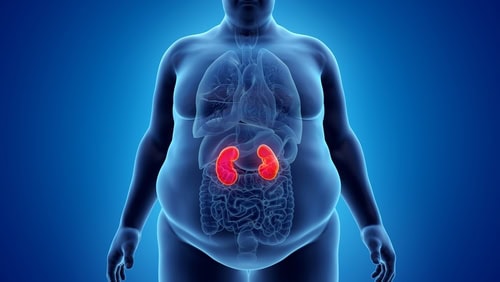
When we think about obesity, what comes to mind? Often it’s weight gain, diabetes, or heart disease. But here’s something we don’t realise — obesity also puts a heavy strain on your kidneys.
Our kidneys act like natural filters, clearing waste and maintaining our body’s balance. But when they’re constantly exposed to excess weight, high blood sugar, and high blood pressure, they struggle. Over time, this silent stress can lead to chronic kidney disease (CKD) [1], often without symptoms until the damage is advanced.
Unfortunately, people are rarely warned about this risk. By the time fatigue, swelling, or changes in urine appear, the kidneys may already be severely compromised.
How Obesity Damages the Kidneys

Obesity affects your kidneys in more ways than one:
- Higher blood pressure: Extra weight increases pressure on delicate kidney filters.
- Insulin resistance: This fuels type 2 diabetes, the leading cause of CKD.[2]
- Inflammation: Fat tissue releases chemicals that scar and damage kidney tissue.
- Overworked kidneys: In obesity, kidneys filter more than normal, wearing them out faster.
The Triple Threat: Obesity + Diabetes + Kidney Disease
When obesity, diabetes, and kidney disease combine, the risks multiply:
- Higher chance of heart failure and cardiovascular complications
- Fewer treatment options, since many diabetes drugs can’t be used safely in kidney disease
- Declining quality of life, with dialysis or transplant becoming the last resort
This is why experts stress: obesity isn’t just about appearance. It’s a chronic, systemic disease.
Why Lifestyle Alone May Not Be Enough

A healthy diet, exercise, hydration, and blood pressure control are vital for kidney protection. But for many, lifestyle changes alone can’t fully reverse the biological drivers of obesity and diabetes.
That’s why modern care includes evidence-based medicines that target weight, blood sugar, and inflammation — working alongside lifestyle changes to protect long-term health.
GLP-1 Therapies and Kidney Health[3]
Newer treatments, such as GLP-1 receptor agonists, are showing promising results:
- Weight loss: Reduces stress on the kidneys
- Better blood sugar control: Slows diabetes-related kidney damage
- Improved blood pressure and cholesterol: Protects blood vessels
- Anti-inflammatory effects: May directly shield kidney tissue
Clinical studies show that GLP-1 therapies significantly lower the risk of kidney failure, loss of kidney function, or cardiovascular death in people with diabetes and CKD.[4]
What You Need To Ask Your Doctor?

If you have obesity, diabetes, or early signs of kidney issues, ask:
- Am I at risk for kidney disease?
- What lifestyle changes can I make today?
- Would medicines that support weight and kidney health help me?
- How should my heart, sugar, and kidney health be tracked together?
Looking Ahead
Kidney disease is on the rise in India, driven largely by obesity and diabetes. But with early recognition, lifestyle measures, and modern therapies, we can delay or even prevent kidney failure.
Final Takeaway
Obesity isn’t just extra weight — it’s a chronic disease with serious consequences for your heart, kidneys, and overall health. The good news? Science offers hope.
If you’re living with obesity and diabetes, don’t wait until your kidneys are at risk. Talk to your doctor about a comprehensive plan that protects your weight, heart, and kidneys.
Take charge of your health today — your kidneys will thank you tomorrow.
Disclaimer: This article is an editorial initiative by Tata 1mg for Novo Nordisk. The information is for educational purposes only and is not a substitute for medical advice. Weight loss medications should be individualized and should be taken under the guidance of a doctor. Please note that Tata 1mg does not endorse any brands and is not responsible for their efficacy.
References:
[1] Nawaz S. Obesity and chronic kidney disease: A current review. Obes Med. 2022;27:100338. Available from: https://pmc.ncbi.nlm.nih.gov/articles/PMC10073820/
[2] Pham H, Shlipak MG, Sarnak MJ, et al. Chronic kidney disease, insulin resistance, and incident diabetes in older adults. Clin J Am Soc Nephrol. 2012;7(4):588-94. Available from: https://pmc.ncbi.nlm.nih.gov/articles/PMC3315343/
[3] National Kidney Foundation. GLP-1 Receptor Agonists (GLP-1 RAs). Available from: https://www.kidney.org/kidney-topics/glp-1-receptor-agonists-glp-1-ras
[4] Perkovic V, Jardine MJ, Neal B, et al. Effects of semaglutide on chronic kidney disease in patients with type 2 diabetes. N Engl J Med. 2024;380(23):2215-2226. Available from: https://www.nejm.org/doi/full/10.1056/NEJMoa2403347